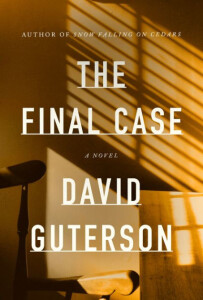
The unnamed narrator of Guterson’s latest novel is a writer who no longer writes. Like many retirees, he finds that house projects and what my friend calls life maintenance tasks quickly swell to fill up his days. Then his 84-year-old father calls to tell him that two things have happened: a tree has fallen in his yard, and he has had a minor car accident.
The tree is not important but the car is, because Royal is still working as a lawyer and now has no way to get to his office. The narrator agrees to be his chauffeur and quickly becomes caught up in one of his father’s current cases.
This setup for the story had me eager to read more. We have the contrast between the two men, one seemingly determined to continue working till his last day on earth and the other setting aside his career and seemingly not missing it at all. We have the loving relationship between them while navigating the problems of an aging parent: Royal decides that even when the car is fixed he should no longer be driving.
And we have the case. Abeba, a young Ethiopian orphan adopted by a fundamentalist Christian couple has died of abuse. The father was at work during the critical time, so it is the mother who is on trial. When no one wants to defend her, Royal agrees to do it, not because he thinks she is innocent, but because he believes everyone deserves a defender and that having one makes the prosecution present a solid case and makes the court apply the law fairly and accurately.
Beyond all these intriguing elements, we have Guterson’s mesmeric flow of well-wrought sentences that kept me reading past every self-imposed deadline. He captures voices of individual characters beautifully, from the gracious, considered words of the elderly lawyer to the Fox News Entertainment Channel-inspired courtroom rant of the accused’s mother. Guterson also gives the narrator a voice that is quiet, and intelligent, while his openness and emotional depth provide a surprising drive.
On another level, the narrator being a writer brings in questions about the uses of fiction and how to recognise it. He says after telling us right off that he used to write fiction:
If that leaves you wondering about this book—wondering if I’m kidding, or playing a game, or if I’ve wandered into the margins of metafiction or the approximate terrain of autofiction—everything here is real.
The story carries the question of how to distinguish fact from fiction into other realms, the trial testimony, for instance, and even within ourselves.
The fact that people do what they do, or think what they think, or say what they say–it can be so inconsistent with their view of themselves that they deny to themselves that it ever happened. They invent a story for themselves in which they didn’t think or feel or do or say anything wrong, and that story becomes reality for them, so real that they’ll defend it to the bitter end, even when the facts in the real world say otherwise. They play this trick on themselves, because if they don’t, they’ll have to accept that they’re not the good person they thought they were.
Guterson and his wife themselves adopted a child from Ethiopia, and the case in this book is apparently based on a real trial that occurred in 2011 involving another Ethiopian orphan. However, this novel is not a courtroom drama. Well, some of it is. And I felt I knew where I was when the courtroom testimony began. But then Guterson pulls the rug out from under the reader, abandoning the trial itself to accompany the narrator to his sister’s tearoom and other activities. At first this third part of the book seemed to me a jumble of unrelated, if beautifully written, anecdotes. Looking back after finishing the book, though, it came together.
One member of my book club was disturbed by the way the father-son relationship overshadowed the story of the young girl, Abeba. While I understand that was not the book Guterson set out to write, I did feel Abeba was given short shrift in the story, was in fact merely a pawn in the story of the father and son. Maybe that is Guterson’s point, or one of them: that no matter how much our hearts may ache for others, in the end we are the protagonists of our own story. Perhaps this is part of his questioning the uses of fiction.
I recently read an excellent essay by Sallie Tisdale in Harper’s Magazine on memory and memoir that questions the idea of autobiographical memory: that our life experiences link together in a narrative arc, and that they become the basis of our identity.
Perhaps Guterson is exploring some of the same questions. If you, too, find such ideas interesting and are willing to immerse yourself in well-wrought prose, I suggest reading this novel all the way through, and then giving yourself time to ponder your reactions.
What novel have you enjoyed that took you by surprise?
